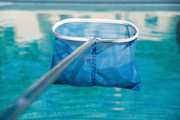Finding a Dead Animal in the Pool

Most dead animals in pools do not pose a health risk to swimmers. If you find a dead animal in the pool, following the simple removal and disinfection steps below will help ensure healthy swimming in the pool.
Dead raccoons in pools, however, can pose a health risk to swimmers. This is because raccoons might be infected with a worm called Baylisascaris, which can be spread to humans. For more information, go to CDC’s Raccoons and Pools page.
What types of dead animals are found in swimming pools?
 Many different types of domestic and wild animals — including skunks, birds, mice, gophers, rats, snakes, frogs, and bats — are commonly found dead in pools.
Many different types of domestic and wild animals — including skunks, birds, mice, gophers, rats, snakes, frogs, and bats — are commonly found dead in pools.
Do dead animals in pools pose a health risk to swimmers?
Most dead animals in pools do not pose a health risk to swimmers. Many germs carried by animals infect only those animals, though a few of the germs they carry can infect people.
Most germs carried by animals are killed by chlorine within minutes in a well-maintained pool. However, to help ensure healthy swimming in a pool where a dead animal has been found, it is important to follow the simple steps below to remove the animal and disinfect the water.
What should I do if I find a dead animal in the pool?*
Follow these steps to remove the animal and disinfect the water:
- Close the pool to swimmers.
- Put on disposable gloves.
- Use a net or bucket to remove the dead animal from the pool.
- Double bag the animal in plastic garbage bags.
- Clean off any debris or dirt from the item used to remove the dead animal.
- Remove gloves and place them in the garbage bags.
- Close the garbage bags and place them in a sealed trash can to help keep wild animals away from the dead animal.
- Wash your hands thoroughly with soap and water immediately.
- Raise the free chlorine concentration to, or maintain it at, 2 parts per million (ppm); maintain the pH levels at 7.5 or less; keep the temperature at 77°F (25°C) or higher. The free chlorine and pH should remain at these levels for 30 minutes.
- Confirm that the filtration system is operating properly during this time.
- Disinfect the item used to remove the dead animal by immersing it in the pool during the 30 minute disinfection time.
*These cleaning and disinfection steps are for animals commonly reported to be found dead in pools. Pre-weaned calves and lambs are often infected with Cryptosporidium, a chlorine-tolerant germ, and could pose a health risk to swimmers if found dead in a pool. After removing a dead calf or lamb from the pool, decontaminate the water.
More Information
- Residential Pool Owners: Contact your local health department for advice since hyperchlorination protocols are beyond the scope of residential pool owners
- Public Pool Operators: Consider performing CDC’s Fecal Incident Response and Hyperchlorination to Kill Crypto Guidelines, either for pools when chlorine stabilizer is in the water or not in the water.
- Page last reviewed: July 6, 2017
- Page last updated: July 6, 2017
- Content source:


 ShareCompartir
ShareCompartir